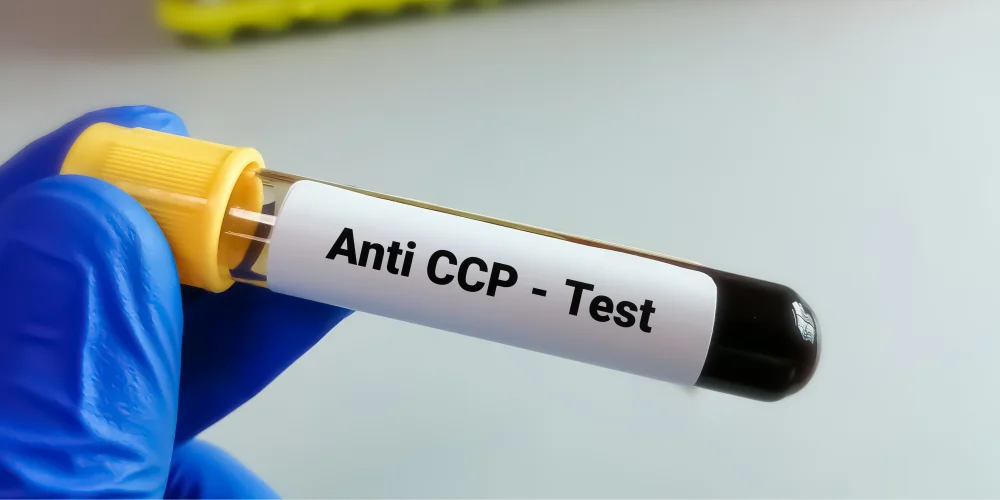Anti CCP Antibodies Test
Rheumatoid Arthritis and Autoimmune Conditions
It is the Anti CCP Antibodies Test is a specific test that helps in the diagnosis of Rheumatoid Arthritis (RA) as an inflammatory condition that is primarily affecting joints. The test can detect that there are anti-CCP antibodies within the blood that are often related to RA. The presence of high concentrations of antibodies may be a sign of RA prior to the onset of symptoms. This ability to detect RA early can make it Anti-CCP Antibodies Test a crucial test to detect RA in its early stages that allows for timely treatment and intervention to stop the severity of the disease and effectively manage symptoms.

When is the Anti CCP Antibodies Test Prescribed?
This Anti-CCP Antibodies Test is typically used in the following situations:
- Diagnosis of Rheumatoid Arthritis : To confirm that there is RA for those who exhibit symptoms like joint stiffness, pain and swelling.
- Early Detection : To identify RA in its initial stages, long before symptoms of RA become apparent.
- Differentiation of Other Conditions : To distinguish RA from other forms of joint or arthritis disorders that provide clarity in the diagnosis.
- Monitor Disease : to track the progress of the disease or treatment response in patients who are already identified with RA.
Preparation for the Anti CCP Antibodies Test
The preparation required for the Anti-CCP Test is not too difficult. Patients are not required to make any changes in their diet or alter their medication regimen in advance of the exam. Regular eating and drinking is permitted. But, it is important to inform your doctor about any supplements or medications that you take, as certain substances may affect the results of your test. Giving a complete medical background ensures a clear interpretation of the results and aids in the efficient treatment of your illness.
Parameters Considered During Anti CCP Antibodies Test
This Anti-CCP Antibodies Test primarily measures the amount of anti-CCP antibodies in blood. This is a crucial factor in diagnosing rheumatoid arthritic. High concentrations of antibodies indicate of a greater likelihood of RA. However, the results of the test are considered as a part of other diagnostic criteria as well as clinical tests to give an exhaustive diagnosis. This comprehensive approach guarantees that tests results can be used effectively in the assessment of the patient’s medical condition.
Time Required for Anti CCP Antibodies Test Report
It is Anti-CCP Antibodies Test is a fairly quick process. Blood is collected from the patient, and sent to the laboratory to be analyzed. Results are typically provided within a few hours or 24 hours, contingent on the lab’s workload as well as processing capabilities. The speedy turnaround is vital for a timely diagnosis and treatment of rheumatoid arthritis.
Anti CCP Antibodies Test Price
This Anti-CCP Antibodies Test is priced at Rs 1,300. This affordable pricing will ensure that patients can access crucial diagnostic information that is essential for the correct diagnosis and treatment of Rheumatoid arthritis. The low cost of the product supports efficient health care planning and intervention.
Book an Appointment for Anti CCP Antibodies Test
Making an appointment to have the Anti-CCP antibodies test with Chirayu Super Speciality Hospital is easy and quick. You can make an appointment for your test via our simple website, or call our department to get assistance. Our team of professionals is committed to providing quick and efficient service. We will make sure you have an effortless and smooth testing experience that will meet your medical requirements.
What Our Patients Say
Hear from our valued patients about their experiences at Chirayu Super Speciality Hospital and how our care has made a positive impact on their health and well-being.


Timely Anti-CCP test at Chirayu Hospital detected my RA early. Wonderful medical support!


Chirayu Anti-CCP test was thorough and quick. Helped in my RA treatment plan.


Professional staff and prompt results for my Anti-CCP test. Great experience at Chirayu Hospital!


Thanks to Chirayu Anti-CCP test, my RA was diagnosed early. Highly recommend them!


Quick and efficient Anti-CCP testing at Chirayu. Very satisfied with the comprehensive care.


Chirayu Hospital Anti-CCP test gave me a timely rheumatoid arthritis diagnosis.
Frequently Asked Questions
Here, we provide answers to some of the most commonly asked questions to help you better understand our services, policies, and facilities. If you have any additional questions, please do not hesitate to contact us.
The test helps diagnose rheumatoid arthritis by detecting specific antibodies associated with the condition.
A blood sample is collected and analyzed to measure the levels of anti-CCP antibodies.
No special preparation is required. You can eat and drink normally before the test.
Results are typically available within a few hours to 24 hours after the sample is processed.
Elevated levels suggest a higher likelihood of rheumatoid arthritis, but further clinical evaluation is needed for a definitive diagnosis.